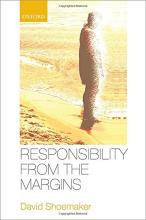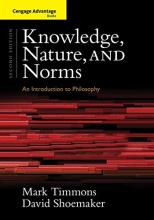David Shoemaker
Professor

Biography
I'm a Professor at Tulane University, jointly appointed in the Department of Philosophy and the Murphy Institute of Political Economy. My specialties are agency and responsibility, personal identity and ethics, moral psychology, normative ethics, and social/political philosophy. I am also an Associate Editor of the journal Ethics, recurring visiting faculty at the Lund/Gothenburg Responsibility Project, a co-founder and current co-editor (with David Sobel) of the still-thriving ethics blog PEA Soup, and the organizer of the biennial New Orleans Workshop in Agency and Responsibility (NOWAR).
My book Responsibility from the Margins (OUP 2015) developed an original tripartite theory of responsible agency by investigating cases of so-called "marginal agency," real-life agents with various psychological disorders or impairments that seem both inside and outside the community of responsible agents. I argued that the ambivalence such agents tend to generate is explained by the fact that there are three types, or faces, of responsibility, and marginal agents are typically responsible on some, but not all, types. This point is brought out by an investigation into the large variety of our "holding-responsible" emotional responses, which roughly break down into three distinct categories, each responding to a different agential feature, the capacities for which generate the three types of responsibility: attributability, answerability, and accountability.
I have published over fifty papers, encyclopedia entries, book reviews, and book chapters, on a wide variety of philosophical topics. My work has appeared in The Philosophical Review, The Journal of Philosophy, Mind, Ethics (3x), Philosophy and Phenomenological Research, Philosophical Studies, Philosophy & Public Affairs, as well as in numerous Oxford University Press volumes. My most widely-cited paper was the theoretical basis for my tripartite theory of responsibility: "Attributability, Answerability, Accountability: Toward a Wider Theory of Moral Responsibility" (Ethics 2011).
My first book was called Personal Identity and Ethics (2009, Broadview Press), and it was an introduction to the variety of ways that the metaphysics of personal identity has been taken to bear on many aspects of ethics (both normative and applied). It arose from my writing the Stanford Encyclopedia entry on Personal Identity and Ethics in 2005 (and which I've substantially updated every three years since then).
Education
University of California, Irvine
University of California, Irvine
Houghton College
Accomplishments
Carol Lavin - Bernick Faculty Research Award
2018
$1500
Griffith Memorial Award
Southern Society of Philosophy & Psychology, Best Conference Paper of 2003 by Younger Scholar
CSUN award for Research, Scholarship, and Creative Activity
2001 - 2004
Articles
Moral torch fishing: A signaling theory of blame
It is notable that all of the leading theories of blame have to employ ungainly fixes to deflect one or more apparent counterexamples. What these theories share is a content‐based theory of blame's nature. Such approaches overlook or ignore blame's core unifying feature, namely, its function, which is to signal the blamer's commitment to a set of norms. In this paper, we present the problems with the extant theories and then explain what signaling is, how it functions in blame, why appealing to it resolves the problems in other theories, what the signaling function implies for a wider range of gray‐area cases, and what the larger significance is of blame's core function for interpersonal interactions in a variety of (non‐moral) normative domains.
Hurt Feelings
In introducing the reactive attitudes “of people directly involved in transactions with each other,” P. F. Strawson lists “gratitude, resentment, forgiveness, love, and hurt feelings.” To show how our interpersonal emotional practices of responsibility could not be undermined by determinism’s truth, Strawson focused exclusively on resentment, specifically on its nature and actual excusing and exempting conditions. So have many other philosophers theorizing about responsibility in Strawson’s wake. This method and focus has generated a host of quality of will theories of responsibility. What I show in this paper is that if Strawson—and his followers—had focused on hurt feelings instead of resentment, not only would quality of will theories of responsibility be disfavored, but none of our other theories of responsibility could adequately account for them. I conclude by exploring what a conundrum this poses for our methods and starting points in theorizing about responsibility.
Good Selves, True Selves: Moral Ignorance, Responsibility, and the Presumption of Goodness
In a remarkable series of studies, George Newman, Joshua Knobe, and colleagues have been making a strong case that most of us believe in the better angels of our nature, that is, we believe that our fellows are, essentially, good. According to the Good True Self (GTS) theory, if an action is deemed good, its psychological source is typically viewed as more reflective of its agent’s true self, of who the agent really is “deep down inside”; if the action is deemed bad, its psychological source is typically viewed as more external to its agent’s true self. 2 In previous work, we discovered a related asymmetry in judgments of blame-and praiseworthiness with respect to the mitigating effect of moral ignorance via childhood deprivation. Inspired by work motivating the GTS theory, we ran a new study to discover whether our asymmetry likewise reflected judgments about the true self. It did. However, it is unclear whether our …
Response-Dependent Responsibility; or, A Funny Thing Happened on the Way to Blame
This essay attempts to provide and defend what may be the first actual argument in support of P. F. Strawson's merely stated vision of a response-dependent theory of moral responsibility. It does so by way of an extended analogy with the funny. In part 1, it makes the easier and less controversial case for response-dependence about the funny. In part 2, it shows the tight analogy between anger and amusement in developing the harder and more controversial case for response-dependence about a kind of blameworthiness (and so response-dependence about a kind of responsibility). It then defends the view from three serious skeptical challenges.
McKenna’s Quality of Will
In this paper, I investigate the role played by Quality of Will in Michael McKenna’s conversational theory of responsibility. I articulate and press the skeptical challenge against it, and then I show that McKenna has the (untapped) resources in his account to deflect it.










